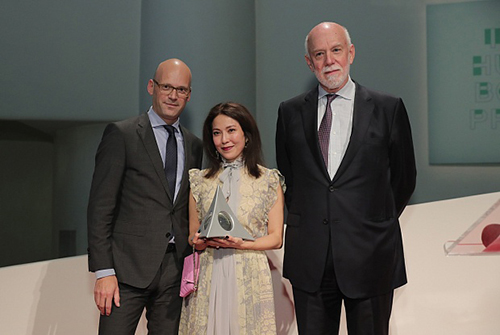Anicka Yi awarded 2016 Hugo Boss Prize
Jury for prize, given by Solomon R. Guggenheim Foundation, admired how experiments in artist’s work “push the limits of perceptual experience in the ‘visual’ arts”
Mark Lander, the CEO of Hugo Boss, Anicka Yi and Richard Armstrong, the director of the Solomon R. Guggenheim Museum and Foundation (Photo: Neilson Barnard/Getty Images for HUGO BOSS)
The New York-based artist Anicka Yi was named the 2016 recipient of the biennial Hugo Boss Prize, which is awarded by the Solomon R. Guggenheim Foundation and sponsored by the German fashion house Hugo Boss. This is the 20th anniversary of the prize, launched in 1996, which gives contemporary artists an award of $100,000 and a solo exhibition at the Solomon R. Guggenheim Museum in New York. The prize’s boldfaced 2016 shortlist also included Tania Bruguera, Mark Leckey—who has a major New York solo show opening this week at MoMA PS1—Ralph Lemon, Laura Owens and Wael Shawky.
“We are particularly compelled by the way Yi’s sculptures and installations make public and strange, and thus newly addressable, our deeply subjective corporeal realities,” the prize’s jury—Katherine Brinson and Pablo León de la Barra, curators at the Solomon R. Guggenheim Museum; Dan Byers, the senior curator at the Institute of Contemporary Art/Boston; Elena Filipovic, the director and chief curator of the Kunsthalle Basel; and Michelle Kuo, the editor in chief of Artforum International—said in a statement. “We also admire the unique embrace of discomfort in her experiments with technology, science, and the plant and animal worlds, all of which push at the limits of perceptual experience in the ‘visual’ arts.”
Yi’s conceptual works explore smell and tactility to challenge the primacy of vision as a sense, and are often made of perishable materials, which she says is a way of “questioning that sort of monumentality of the work that is going to outlive all of us as a relic of history” in her video interview for the prize. For her 2015 exhibition at The Kitchen in New York, You Can Call Me F, Yi cultivated bacteria with swabs she took from 100 women and painted with this organic material “like pigment” in an experience she calls “glorious” and “really fun”. She says that while she uses scientific processes in her work, it is ultimately driven by narrative: this particular work asked the question “What does feminism smell like?” Yi’s solo exhibition at the Solomon R. Guggenheim Museum is due to open in April.
